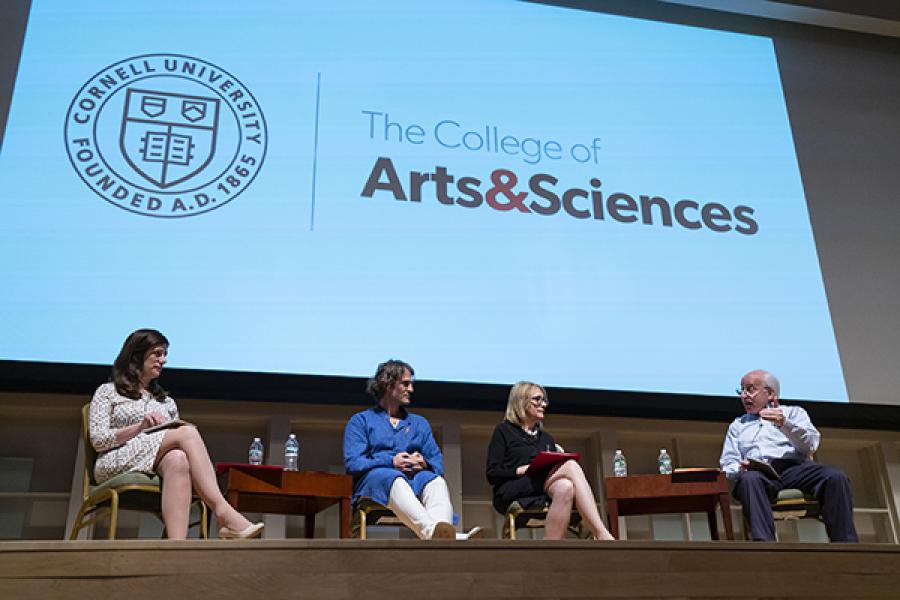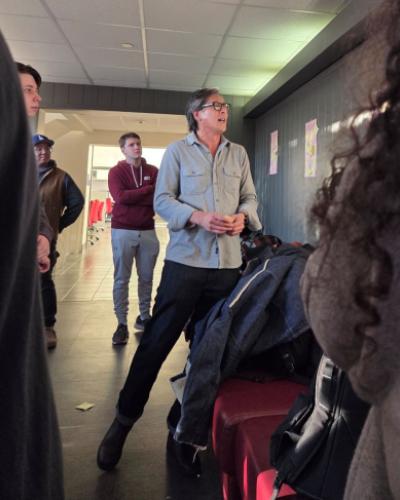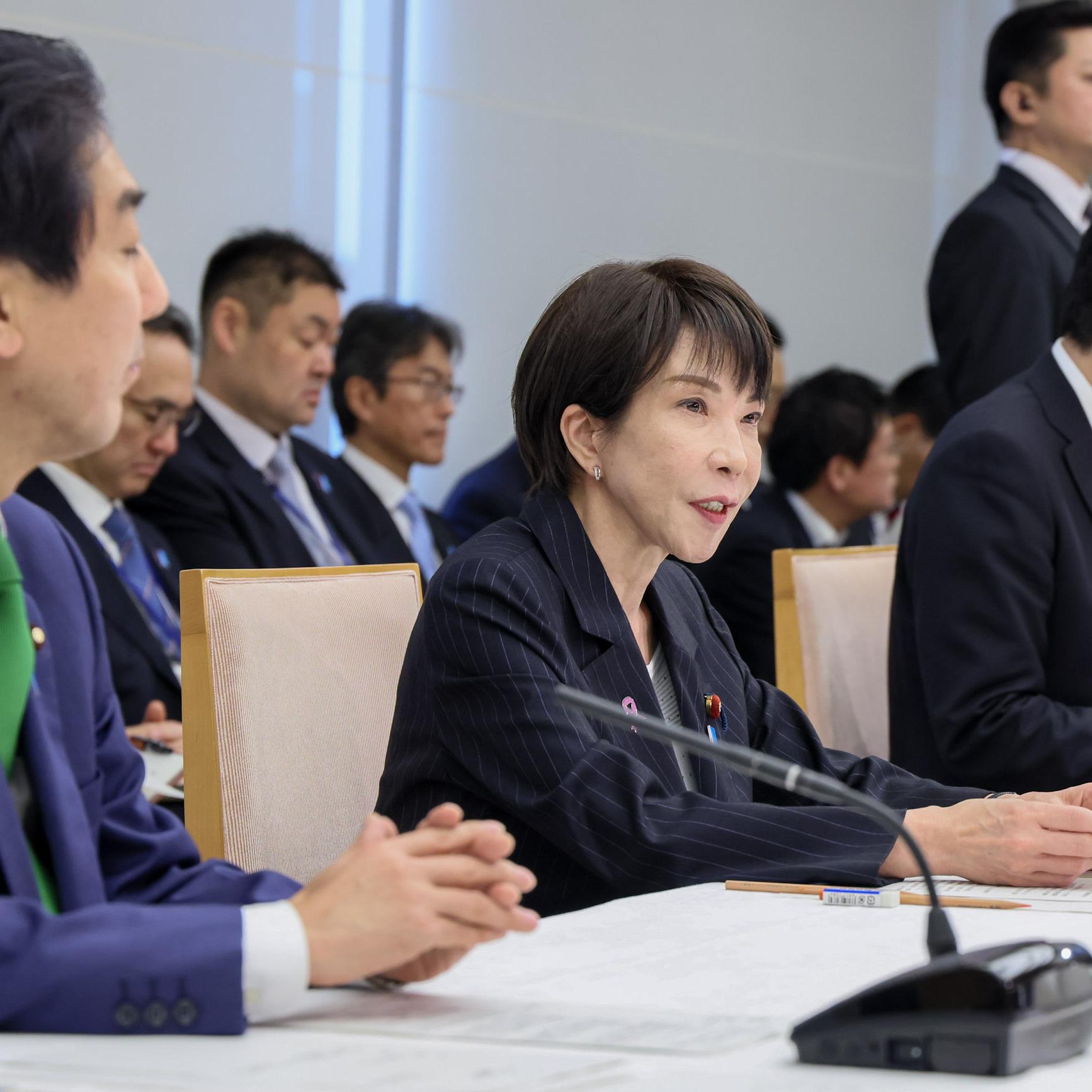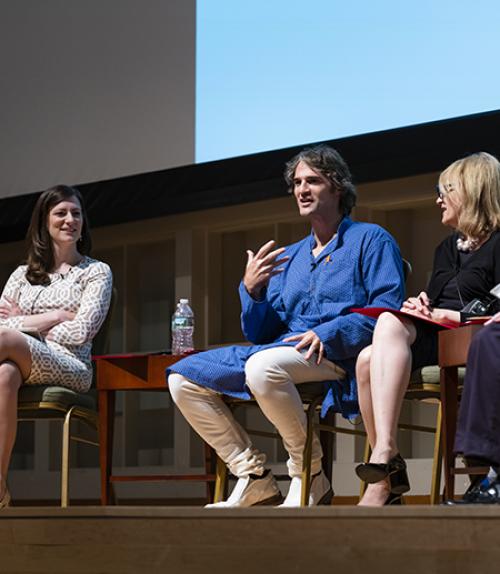There aren’t always two sides to a story.
Good journalists are objective, but not necessarily neutral.
Taking out the media is one of the first steps in an authoritarian’s play book.
These are some of the thoughts and concerns shared by panelists June 7 during “International Politics and the Fourth Estate: The Role of the Media in Social and Political Movements Worldwide,” a Cornell Reunion event sponsored by the College of Arts & Sciences.
Moderated by Glenn Altschuler, the Thomas and Dorothy Litwin Professor of American Studies and dean of Continuing Education and Summer Session, the panel featured Jeffrey Gettleman ’94, New York Times correspondent and Pulitzer Prize winner; Mabel Berezin, professor of sociology; and Alexandra Cirone, assistant professor of government.
There are lots of challenges for the press in our current political climate, panelists said, including changes that have taken place in news gathering and delivery.
Today, 2/3 of Americans get their news from social media, Cirone said, but social media was not designed to be a news platform. More generally, across the internet there are a multiplicity of outlets, and few formal gatekeepers or checks on whether the news is coming from trained journalists. Online content, she said, is also increasingly driven by advertising.
That’s not true for the work done by Gettleman, the Times’ India bureau chief, who talked about his mission to make people care about places that may be foreign to them.
“I’m in this business to connect with people who may be experiencing the most disturbing moment of their lives, some history changing moment,” he said. “That’s when we arrive and ask people to share with us. If journalism is done right, the stories make people care about people they never imagined existed.”
Gettleman said it’s difficult for journalists to remain completely neutral to your sources, especially doing the kind of work he’s doing. “I have to look at all of the sides, at the roots of the problem,” he said. “I’m not distant from the people I’m writing about, but I am objective.”
From left, Alexandra Cirone, assistant professor of government; Jeffrey Gettleman ’94, New York Times correspondent; Mabel Berezin, professor of sociology and Glenn Altschuler, the Thomas and Dorothy Litwin Professor of American Studies and dean of Continuing Education and Summer Sessions.While news gathering processes have changed and sources for news are expanding, it stands to reason that accurate news, misinformation and opinion have become conflated like never before, Altschuler posited.
Berezin illustrated this misinformation by showing a poster that cropped up all over England during the Brexit vote, allegedly showing lines of immigrants waiting to “invade.”
Luckily, Cirone said, even though fake news seems to be widespread, research shows that individuals overestimate their exposure to fake news and most of the engagement is driven by a small subset of users.
The biggest problem, panelists said, is that this constant concern over fake news is harming the public’s overall trust in mainstream media sources.
“The actual problem is not that you will see a bogus story and it will make you change your mind or change your vote,” Cirone said. “But if you think there’s noise in the system you start to doubt everything, even things that are true.”
Gettleman said this is evident just by looking at the nomenclature. “When I got into the business, I was a member of the press,” he said. “People didn’t use the word media. Media sounds like some sort of bacteria. There was a lofty connotation with being a member of the press, but somewhere the press became part of this more threatening media.”
This lack of trust in the media can lead to a lack of trust in democratic institutions, a lack of trust in people with expertise (i.e. scientists studying climate change) and to a crackdown on free speech, Cirone said.
So, what can citizens do?
Cirone said citizens should support mainstream news outlets, in addition to pressuring social media companies to self-regulate (by policing their platforms, and deleting fake accounts).
Gettleman encouraged support for mainstream media sources, which do invest time, money and effort into telling the truth.
Berezin encouraged readers to be cautious and savvy in their consumption of news. In Europe, readers choose their newspaper based on their political opinions, but they don’t confuse facts with opinion.






